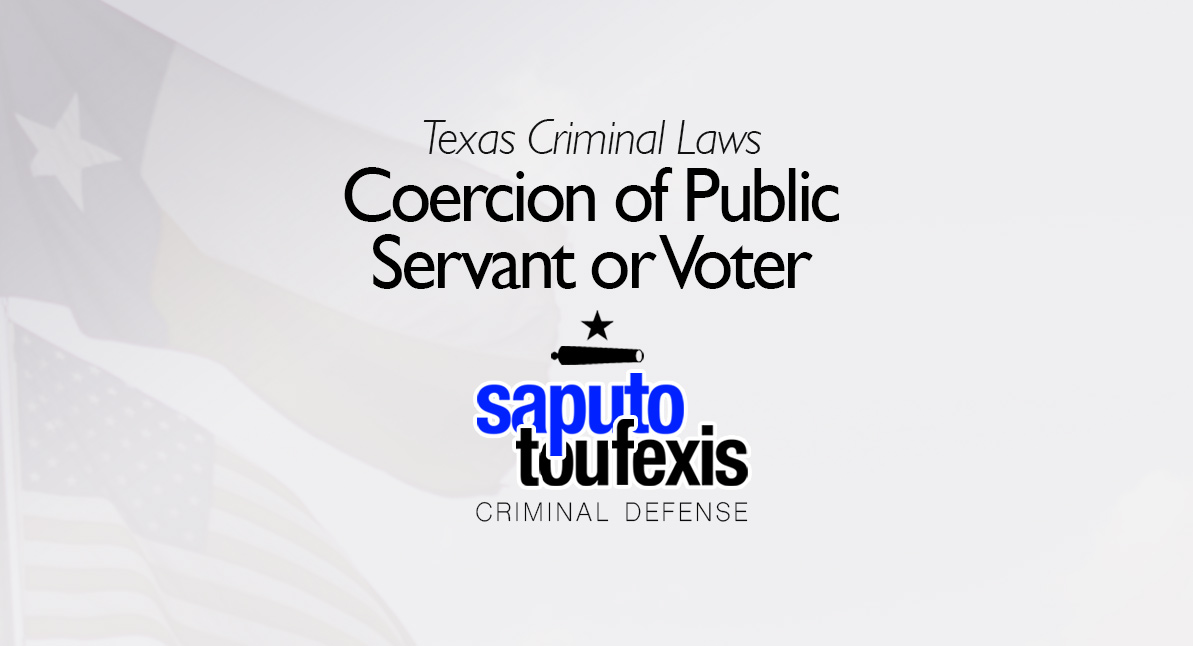The Texas Coercion of Public Servant or Voter law gives police the right to arrest you if they believe you used coercion to influence or attempt to influence a public servant or a voter.
FAQs about the
Coercion of Public Servant or Voter law in Texas
- What is the current Texas law about Coercion of Public Servant or Voter?
- What is the penalty for a Texas Coercion of Public Servant or Voter offense?
- How can I be charged with a Coercion of Public Servant or Voter offense in Texas?
- What is the statute of limitations for Coercion of Public Servant or Voter in Texas?
- Can you get probation for Coercion of Public Servant or Voter in Texas?
- What level of crime is Coercion of Public Servant or Voter in Texas?
What exactly the legislature meant by “coercion” is unclear, as the term is not defined in the statute or the Penal Code chapter that contains the statute.
Have you been charged with Coercion of Public Servant or Voter? Contact us today to discuss legal representation.
or Text or Call (888) 239-9305
The Texas legislature codified this criminal offense in Texas Penal Code Section 36.03. The legislature did not update this law in 2025. In fact, this law has not been amended since 1994.
The Penal Code classifies the Texas Coercion of Public Servant or Voter law under Title 8 “Offenses Against Public Administration,” Chapter 36 “Bribery And Corrupt Influence.” Learn more about the Texas offense of Coercion of Public Servant or Voter below.
What is the current Texas law about Coercion of Public Servant or Voter?
AV Preeminent Texas lawyer Paul Saputo provides the current law defining Coercion of Public Servant or Voter in Penal Code Section §36.03, as follows:[1]
(a) A person commits an offense if by means of coercion he:
(1) influences or attempts to influence a public servant in a specific exercise of his official power or a specific performance of his official duty or influences or attempts to influence a public servant to violate the public servant’s known legal duty; or
(2) influences or attempts to influence a voter not to vote or to vote in a particular manner.
What is the penalty for a Texas Coercion of Public Servant or Voter offense?
A conviction for Coercion of Public Servant or Voter is punished by default as a Class A misdemeanor,[2] with a maximum possible fine under Texas state law of up to $4,000 and jail time of up to one year.
But if the state proves to a jury that you threatened to commit a felony against the voter, then a conviction for Coercion of Public Servant or Voter in Texas is punished as a Felony of the Third Degree,[3] with a maximum possible fine under Texas state law of up to $10,000 and prison time of up to 10 years.
How can I be charged with a Coercion of Public Servant or Voter offense in Texas?
You can be charged with Coercion of Public Servant or Voter in Texas if the state’s attorneys believe that each of the elements of §36.03(a) as described in the section above have been met.
What is the statute of limitations for Coercion of Public Servant or Voter in Texas?
Misdemeanor level Coercion of Public Servant or Voter charges have a two-year limitations period.[4] Felony level offenses follow the default felony limitations period rule, which specifies a three-year limitations period.[5]
Can you get probation for Coercion of Public Servant or Voter in Texas?
The Texas Code of Criminal Procedure allows both judges and juries to grant probation for Coercion of Public Servant or Voter, and judges are also allowed to accept deferred adjudication plea deals.[6]
Note, however, that no matter the offense, neither judges nor juries may recommend community supervision for any suspended sentence of over 10 years.[7] Also, judges may not grant community supervision after a conviction if (1) the defendant used or exhibited a deadly weapon during the commission of the felony or immediate flight thereafter and (2) the defendant used or exhibited the deadly weapon himself or was a party to the offense and knew that a deadly weapon would be used or exhibited.[8]
What level of crime is Coercion of Public Servant or Voter in Texas?
The Penal Code classifies the punishment for Coercion of Public Servant or Voter as a Class A misdemeanor, unless the coercion is a threat to commit a felony, in which event it’s a third degree felony.
Learn more about the penalty range for this offense in the section above.
Legal References:
^1. Texas Penal Code §36.03. This law is current as of 2025.^2. Texas Penal Code §36.03(b)^3. Texas Penal Code §36.03(b)^4. Code of Criminal Procedure 12.02(a)^5. See Code of Criminal Procedure 12.01(11)^6. See Chapter 42A, Texas Code of Criminal Procedure, Art. 42A.054, Art. 42A.056, Art. 42A.102^7. Art. 42A.053(c), Texas Code of Criminal Procedure^8. Art. 42A.054(b), Texas Code of Criminal Procedure










